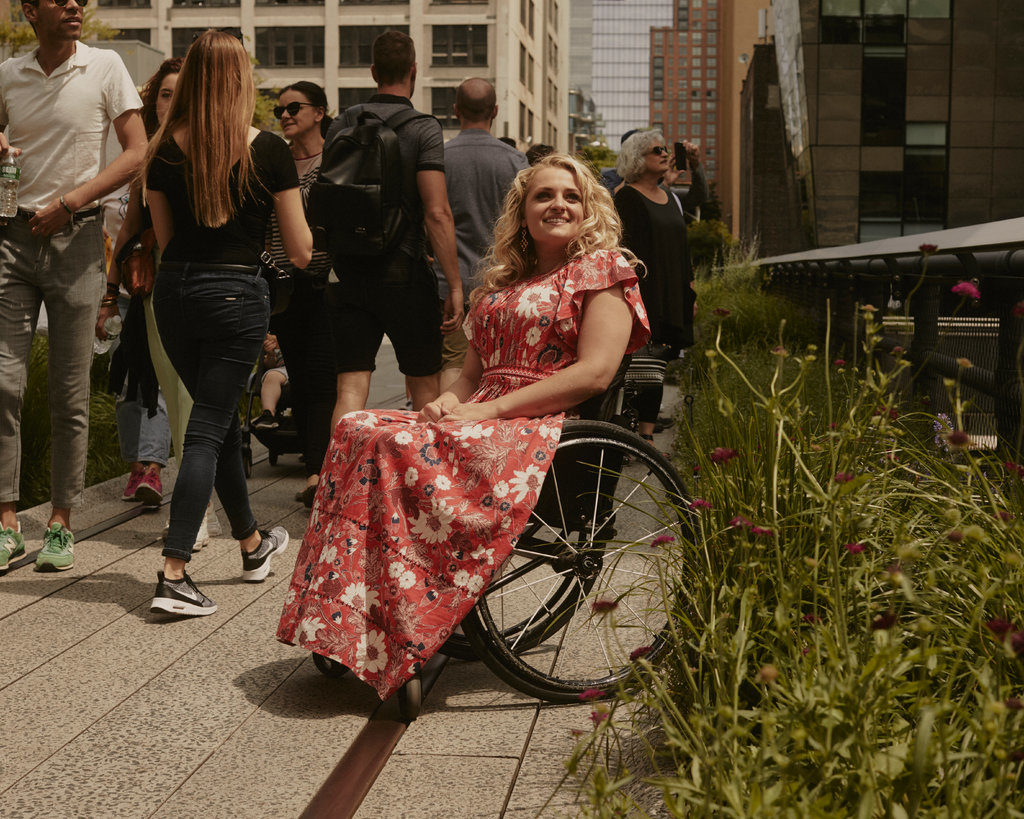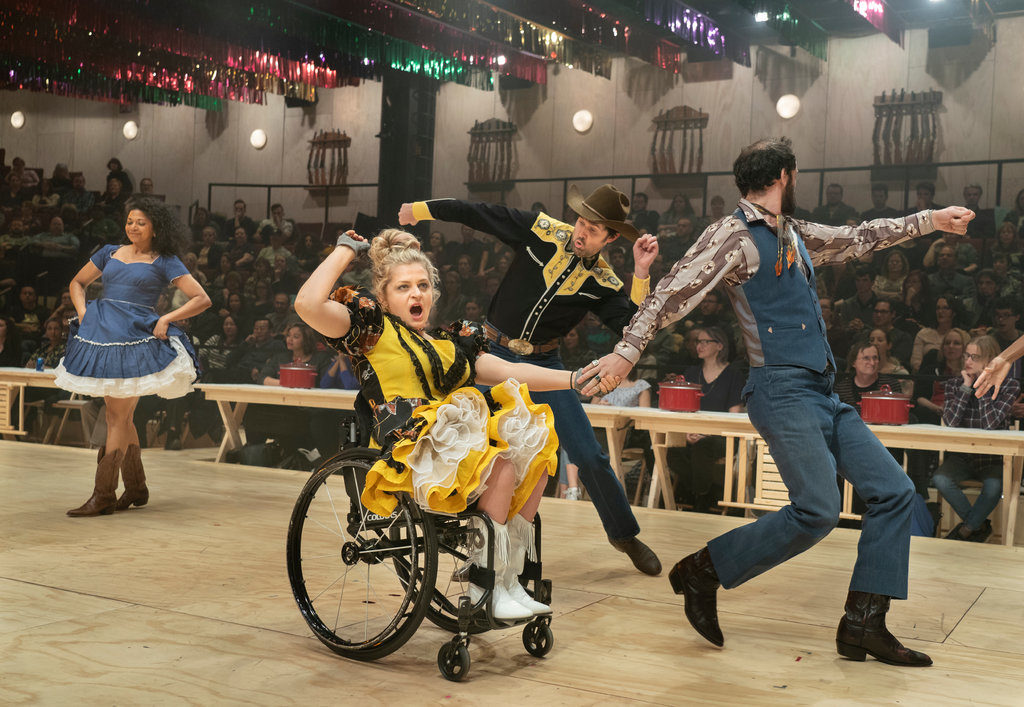
High on a shelf in Ali Stroker’s Broadway dressing room sits a Barbie in a box. But it’s not just any Barbie — it’s a doctored doll, refashioned as a farmgirl in a wheelchair.
“My dresser made it for me,” said Ms. Stroker, who is starring as the lusty Ado Annie in the Tony-winning revival of “Oklahoma!” “I was so moved by that because I’ve never had a Barbie that was in a wheelchair, let alone a Barbie that’s me. And she was like, ‘There should be so many more.’”
Ms. Stroker, 31, made Broadway history Sunday night when she was named best featured actress in a musical, becoming the first performer who uses a wheelchair to win a Tony.
She was just two years old when the car in which she was riding swerved to avoid a pile of leaves and collided head-on with another vehicle. Her brother suffered a traumatic brain injury; she suffered a spinal cord injury and was paralyzed from the chest down.
She has no memory of walking. But she does remember her first wheelchair — it was red.
When she was 7, a 12-year-old neighbor girl, Rachel Antonoff, returned from theater camp to declare that she was going to direct a backyard production of “Annie,” with Ms. Stroker as the star. And everything changed.
“When I got on stage, it was the first time that I felt powerful,” Ms. Stroker said, tearily — to her surprise, she has been crying, a lot, since Sunday, still overwhelmed by a moment that barely seemed possible. “I was used to people staring at me, but they were staring at me because I was in a wheelchair. And when I was on stage, they were staring at me because I was the star.”
She’s been acting ever since, and on Sunday she arrived at the Tonys in a bright yellow gown created by Ms. Antonoff, who is now a fashion designer.
“So many times, our society is taught, ‘Don’t look, don’t stare and don’t ask — that would be rude,’” Ms. Stroker said. “As an artist, I’m saying, ‘Look at me now. Look at my body. Look how I move my chair.’ I’m asking, and that makes me feel my most powerful self.”
We talked in her dressing room at Broadway’s Circle in the Square theater on Tuesday afternoon, just before her first post-Tonys performance. Here are edited excerpts from the conversation.
Q. Where is the Tony?
A. It’s in my bag. I needed to have it with me. I just wanted to feel the weight of it.
You addressed your acceptance speech to children with disabilities. Why?
I just wanted to talk to those kids and say, “You can do it.”

How did you feel about being seated backstage when they were announcing your category?
I think I had a dream that maybe there could be a ramp built. It’s more than just a logistical thing — it’s saying that you are accepted here, in every part of you. I know that the Tonys did the best that they could, and I know that Radio City did the best they could. I am not naïve — there are a lot of logistical things you have to deal with around buildings that were built a long, long time ago. They did put in a ramp backstage. And I had a seat in the front, but the way the night worked out, I never got to my seat.
When did you realize that this “Oklahoma!” was going to be so different from other productions?
Once we got into rehearsal, I was like, “Oh, this is not like most musicals I’ve ever worked on.” But I believe in the truth, and I think that Daniel (Fish, the director) has been able to bring the truth out of “Oklahoma!” It’s hard to look at things that are uncomfortable. But the only way to make progress is to feel the discomfort. And that’s the same about disability.
What drew you to Ado Annie?
She doesn’t ever apologize for who she is. She doesn’t have any shame about who she is. Her wants, her desires, are so clear. And her desire to explore, through sexuality and relationship, feels so true for me. Her line — “How can I be what I ain’t?” — so many girls need to hear that. So many people need to hear that.
Do you ever see people in chairs in the audience for “Oklahoma!”?
I do, and I’m always so excited. The other night two Paralympian wheelchair racers came to the show. And still, for me, seeing me in someone else is a powerful, powerful feeling. Something happens in my heart. I feel a calmness.
You’ve expressed some concern about accessibility at Broadway theaters. What is your concern?
These theaters are really old in New York, and they’ve made the houses accessible for patrons, but the backstages have not been made accessible. If I were to get another show, it would be another conversation about how to make the backstage accessible. Here at Circle in the Square, they put in a chairlift for me, and full ramping so I can get to both sides of the stage, and an accessible bathroom. It’s great. It’s necessary. And it’s time.

How do you feel about being a symbol?
I feel excited and I feel proud and I hope there are so many more soon.
Do you get tired or resentful about answering these questions?
No. I know in many ways that this is what I was born to do. When a little baby is injured, you always wonder why. And I think for my parents it’s so clear I was meant to be in this seat, to bring my joy, and my light, and my love, to something that a lot of our culture and a lot of our society looks at as just a shame, or a tragedy. I don’t think any part of my life is not meant to be.
I often think of singers drawing themselves up to full height to belt, but you are demonstrating that that’s not necessary.
I wear a brace that supports my core, and I do all my movement from my neck and my shoulders. I sing from my upper back — these muscles are what I engage to get power to sing. But singing for me is not technical, it’s spiritual. It is a cry. It is a source of expression. It is where I don’t have limits. I feel like I can fly when I sing. One of the crazy parts about being paralyzed is you have such a specific relationship to your body. You know the parts that you cannot use, you cannot feel. So the parts that you can, sometimes you feel like you have superpowers.
You’ve talked a lot about people who encouraged you. Who discouraged you?
There were definitely people who were like: “No, this is going to be really hard for you.” “I don’t think you can do this.” Or: “She can’t be a part of this because she’s in the chair.” But how much power I give to that in my life is my choice, and I don’t want to give any.
How do you think this award will affect what’s next for you?
I hope that it will open more doors. I hope to reach people and remind them that everything is impossible until it’s done.